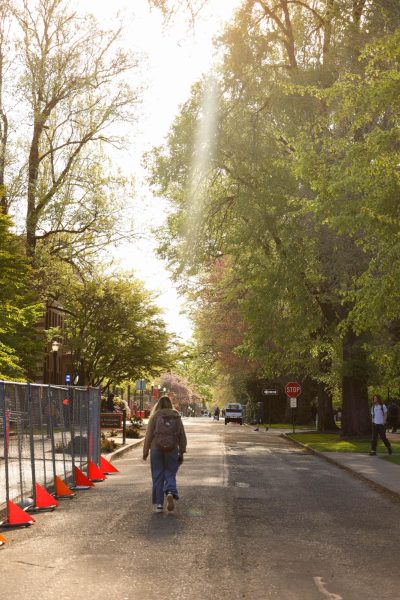Opinion: English degree writes in success for students
May 21, 2018
English degree writes students in for success, liberal arts is valuable at a STEM school.
The value of the English degree has been underrated and anyone is conscious of the stereotypes associated with their field.
“Some people make a joke out of studying English, “Oh you already know the language,” Sydney Sullivan, senior studying English and minoring in writing, said. “But I’ve had dozens of people come to me and ask for help on their papers, write for them or get them through the process.”
An English degree offers students cultural insight, creative career options and is always going to be in demand. Attaching English or writing coursework to a degree gives you critical thinking skills, helps you problem solve and immerses you in a variety of voices and style.
“No matter what kind of research you’re doing, you need to be able to translate that to others,” Sullivan said.
Oregon State University’s foundations were built on the title of being an agricultural school in 1890, adopted liberal studies in 1932 and engineering in 1935. The sands of time have eroded this primary focus and the university has broadened its scope.
According to the enrollment summary for spring term, OSU has about 7,926 students committed to the College of Engineering, 4,041 to the College of Liberal Arts and 2,413 enrolled in the College of Agriculture program.
Humanity majors have nationally been on the decline, according to Inside Higher Ed, with an 8.7 percent decrease between 2012 and 2014. In the College of Liberal Arts there are only 173 committed English majors at OSU.
Writing and reading are soft skills not often taken seriously, although they are the foundations of our social culture.
“It’s a really beautiful thing to be able to read so many different human beings’ experiences of the world. You’re experiencing their thoughts their passions and the thing they needed to write down because they couldn’t help themselves,” Sullivan said.
English is a universal degree. Some people’s imagination for careers begins and ends with teaching, when in reality there are a variety of things one can do from scientific and journalistic writing, to legal and advertising work.
Ethan Heusser, senior studying English with minors in writing and computer science, is heading to University of Iowa to study fine arts in poetry in the fall to pursue academia and fulfill his aspirations to be a poet.
“I think it’s true that English does a good job at developing soft skills. It’s difficult for a job to single-handedly make you a good writer because it takes many years of practice on its own. You’re building muscles here that you’ll use for the rest of your career,” Heusser said.
OSU’s literary program has been highlighted for a variety of awards including the Poetry Foundation’s Award for best poetry of the year, as well as the Whiting Award, which recognizes the nation’s top 10 emerging writers.
“The faculty are objectively pretty incredible. They do reputable and interesting research, they have good relationships with students and care a lot about their teaching abilities, and everyone is invested in student education and well-being. The current challenge that the department faces is in spreading awareness in what OSU has to offer,” Heusser said.
Since OSU prides itself on research and scientific exploration, liberal studies students lose identity, while prospective students miss out on learning the great things in the program.
“I can see how majors might feel lost at a school where it’s STEM oriented. The buildings we are in are smaller, older and a little more worn down. Where as the STEM schools are a little more grandor,” Sullivan said.
Physical differences aside, OSU markets the department differently. Adopting the image as a STEM research school fails to address the large student population in humanities programs.
“[OSU] is known for that highlight (agriculture) but is not defined by it,” Heusser said.
Yet, instructors and professors dedicate their time and energy to their students, devoting themselves wholeheartedly, bending traditional approaches to material.
“The teachers in the program are really good about the analytical sense of reading and being able to give you an experience with a book even if you’ve read it before, which is really beautiful and fun and what really makes it click,” Sullivan said.
Getting an English degree gives one freedom and allows creativity for after graduation.
“Like if you’re an engineer it’s pretty obvious what you’re going to do with your degree. I think that people get scared with the uncertain or unknown and English falls in that category, because you can do a lot with that degree and people either don’t realize that or don’t want that kind of freedom,” Sullivan said.
Choosing English as your degree doesn’t limit you to astereotypical career, it opens up possibilities for students and adds breadth and depth to the professional world.
“English degree is about shaping not what you earn, but who you are. Keep in mind that just because there isn’t a single clear path ahead that doesn’t mean that there are no paths, it means that there are an infinite number,” Heusser said.






















































































































